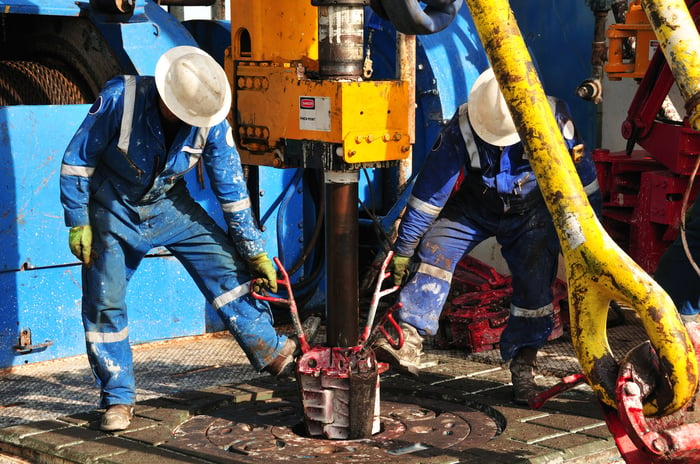This year, the market fell out of love with Devon Energy (DVN 0.29%). At the time of writing, the stock is down more than 15% year to date. The move likely comes down to a combination of reasons that mask the fundamental attractiveness of the stock. As such, the dip in the share price looks like a good buying opportunity. Here's why.
Devon Energy's disappointing stock performance in 2024
Comparing Devon with one of its oil and gas exploration and production peers, Diamondback Energy (FANG 0.20%), helps to highlight one of the reasons why the market has turned against Devon. The two companies started the year with comparable market caps; however, Diamondback's stock is up 16%, while Devon Energy's stock is down 15%.
The disparity in the performance probably reflects the companies' mergers and acquisitions (M&A) activity this year. The market liked Diamondback's deal to merge with Endeavor Energy Resources , and it did not like Devon's acquisition of Grayson Mill Energy.
The big difference between the two acquisitions is that Diamondback's deal increased its exposure to the Permian region, while Devon's deal added Bakken region assets. Due to the former's greater output, Permian assets tend to command a valuation premium over those in the Bakken.
Bakken Region Total Oil Production data by YCharts
As such, the market is stressing the strategic direction of the two companies and Devon Energy's asset quality. Still, I think three considerations make Devon Energy a buy.
Devon is still a play on the Permian
The Grayson Mill Energy assets will increase Devon's exposure to the Bakken. However, Devon is still a company with its core production and resources in the Delaware Basin (part of the larger Permian Basin). For example, its Delaware assets were responsible for 67% of its production in the third quarter and represented 60% of its In comparison, its Williston Basin (Bakken) region assets contributed just 8%. The addition of Grayson Mill will take its Bakken asset production from 50,000 barrels of oil equivalent per day (BOED) to 150,0000 BOED, meaning it will grow to about 20% of production.

Image source: Getty Images.
In addition, while some investors might doubt Bakken assets based on the chart above, there are also a few reasons to be optimistic. The acquisition of Grayson Mill assets isn't just about adding resources and taking advantage of relatively low valuations at a time of relatively high oil prices; it will add scale to the Bakken, enabling Devon to improve the efficiency of its legacy and additional assets. In addition, Devon can make operational improvements and generate cost and marketing synergies by owning more assets in one region.
Productivity is improving
Management took a conscious decision to invest in its core Delaware Basin assets this year to try and improve productivity, and it's working. Having started the year forecasting production of 650,000 BOED for 2024, management raised the estimate to a range of 677,000 BOED to 688,000 in August. Fast forward to November, and the new target is 811,000 BOED to 833,000 BOED bolstered by an incremental 110,000 BOED from the acquired Williston Basin assets.
Whatever way you look at it, Devon has improved the productivity of its Delaware assets -- Delaware production rose 11% to 488,000 BOED in the third quarter compared to the same period last year.
Dividends are for the long term
Devon's management disappointed near-term income chasers by neglecting to pay a variable dividend in the third quarter.

Data source: Devon Energy presentations. Chart by author.
Still, the point of investing in stocks is that investors believe management can generate better returns on money than investors can. As such, management's decision to focus on paying the fixed dividend of $0.22 a quarter and allocating cash to buy back $295 million worth of stock in the quarter makes perfect sense given the decline in the share price. In addition, Devon retired $472 million of debt in the quarter. Both actions will make it easier to increase dividends per share in the future as they reduce the share count and future interest payments.
A stock to buy
All told, the stock sell-off is somewhat unwarranted and creates a good buying opportunity in a company with plenty of potential to generate substantial cash flow and pay significant dividends to investors in the future. Management estimates it will generate about 9% of its current market cap in free cash flow assuming a price of oil of $70 a barrel. That would give plenty of scope for dividend increases as Devon ramps up oil and gas production across all its assets and generates synergies in the Bakken.







